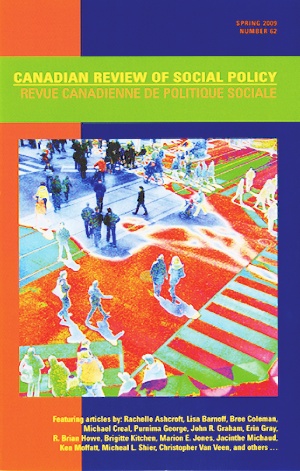Process as Labour: Struggles for Anti-Oppressive/Anti-Racist Change in a Feminist Organization
Abstract
Even though anti-oppression social work practice (AOP) and social change has been central to the literature of social work surprisingly little has been witten about how worlcers struggle daily to integrate anti-oppressive agendas. In this paper we illustrate how in a progressive feminist organization individuals committed to social justice continue to struggle as they work towards anti-oppressive change. Through the results of a case study with a feminist organization that bases its vision on an anti-oppressive and anti-racist model of practice, we make the case for a focus on process as a critical component of the labour of anti-oppression work. Through this lens, we are able to outline some of the ongoing struggles that occur within progressive organizations as organizational members work toward anti-oppressive change. Part of the job of progressive social service workers is to reflect upon the process of working together within an organization as well as the purpose and nature of their work. Our research finds that the processml nature of antioppression work is ongoing, open ended and irresolvable. That is, struggle is to be expected when agencies are working to implement anti-oppressive pactices. Mgme si lu pratique anti-oppressive du travail social et le pogr2s social sont au CEUT &S e'crits en service social, curieusement, on trouve tr2s peu de textes sur lu nature des combats quotidiens de l'anti-oppression. Duns cet article, les auteurs illuscrent comment, dans un organisme progressiste fe'rniniste, la re'sistance au changement anti-oppressif persiste. Parmi les actiuite's du travailkur social progressiste, on trouve la re'flexion sur le processusdu travail de collaboration azi sein cl'un organisme ainsi que le but et la nature des t&hes h accomplir. La nature pocessuelle du travail anti-oppressif selnble &re inde'termine'e et impossible h re'souclre. Sur la base des re'sultats tire's d'une e'tude de cas sur zm organisme fe'ministe qui fonde sa vision sur un mod& de pratiques anti-oppressives, les auteurs prgconisent de cibler le processus en tant que comnposante critique des activite's du travail anti-op~ressifA. travers ce pr i sm, nous po~~uondskg ager certaines des re'sistances qui sz~rviennent au sein &S organismes progressistes et qui agissent contre les progres anti-oppressifs.Downloads
Published
How to Cite
Issue
Section
License
1-The author guarantees that the manuscript is an original work not published elsewhere in print or electronically in whole or in part, except in abstract form, that the author has the full power to make this contribution, and that the manuscript contains no matter libelous or otherwise unlawful or which invades the right of privacy or which infringes any proprietary right.
2-The author guarantees that the manuscript has not been previously published in print or electronically and that if the manuscript contains any tables, figures or images fully reproduced or closely adapted from previously published material, the author must obtain the necessary permission from the author/publisher holding the original copyright prior to publication in CRSP. The author may be required to produce evidence of permission granted to CRSP’s editors.
3-As a condition of publication in CRSP, the author assigns all copyright to CRSP, including but not limited to the right to publish, republish, and otherwise distribute this manuscript in print, electronic, or other formats. As CRSP is a non-profit interdisciplinary scholarly journal, the author will receive no royalty or other monetary compensation for the assignment set forth in this agreement.
For the purpose of full disclosure, CRSP will not normally use the content provided by the author in a commercial venture, but for the purpose of disseminating the author’s content to as many readers as possible. For distribution, third parties engaging in commercial activities may be contracted to distribute the content globally, and such parties may make a profit out of the author’s content in their normal course of business. CRSP will not pay the author or reimburse the author in any form based on such commercial activities because the conduct of such commercial activities is outside the control of CRSP.
Any future reference to or use of this published material by the authors must acknowledge CRSP as the original place of publication.
PERMISSION REQUEST/ARCHIVING
Permission is given to author(s) receiving funding via Tri-Council Agencies, the Canadian Institutes of Health Research (CIHR), the Natural Sciences and Engineering Research Council of Canada (NSERC) and the Social Sciences and Humanities Research Council (SSHRC), to make their publications freely available in an Open Access repository within the stated deadline by the Tri-Council Agencies (12 months following publication). Archiving of publication must be a manuscript copy bearing none of the CRSP headers, footers or any other distinguishing marks. No links to the article on the CRSP website is permitted.
Permission requests from third parties to reproduce articles in part or full in academic/educational publications can be directed to the managing editor of CRSP, and will not be unreasonably denied.

